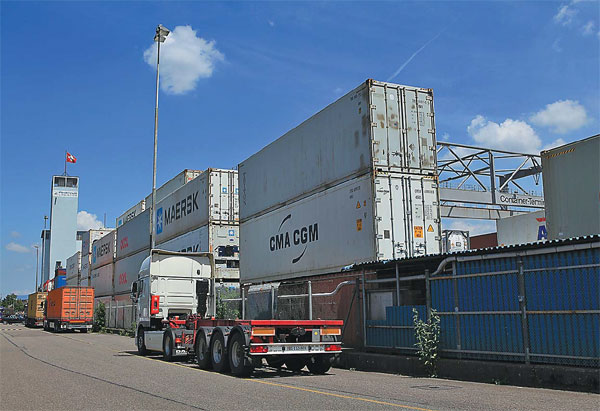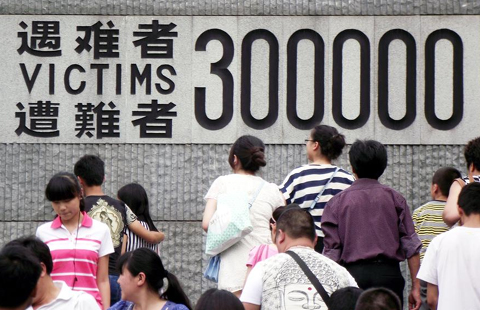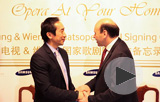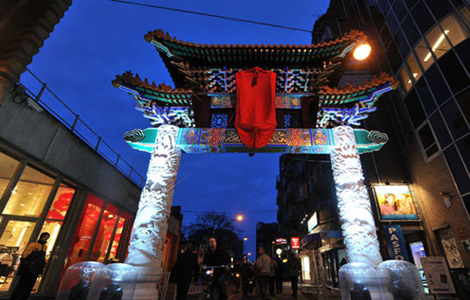Swiss free-trade deal comes into force
By Cecily Liu ( China Daily Europe ) Updated: 2014-07-04 08:11:11
|
Basel is a major logistics center in Switzerland. Photos by Cecily Liu / China Daily |
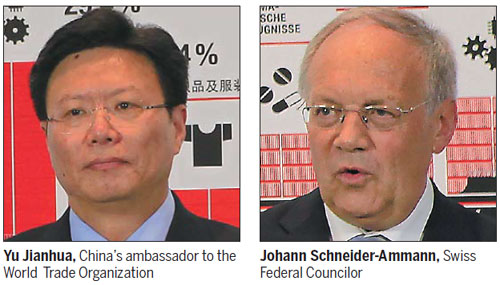
Agreement grants zero tariffs on 99.7 percent of Chinese exports to Switzerland, and 84.2 percent of Swiss exports to China
The free trade agreement signed between Switzerland and China last July came into effect on July 1, giving a strong push for bilateral trade and investment relations between the two countries.
Switzerland is the second European state and the third member of the Organization of Economic Cooperation and Development to complete an FTA with China.
China signed a FTA with New Zealand in 2007 and a FTA with Iceland in 2013.
The FTA grants zero tariffs on 99.7 percent of Chinese exports to Switzerland and 84.2 percent of Swiss exports to China.
If calculations are also made to include those products with reduced tariffs, the FTA covers 99.99 percent of Chinese exports to Switzerland and 96.5 percent of exports in the other direction.
The FTA also includes other bilateral agreements, including cooperation in tackling environmental issues, labor and employment matters and intellectual property protection.
China's ambassador to the World Trade Organization Yu Jianhua says the FTA has great significance because it shows commitment and confidence from both governments to deepen cooperation.
"Switzerland is an economically developed country, with abundant technological and industrial strength.
"China is the world's largest developing country, with very big market demand and growth potential. The two economies are strongly complementary."
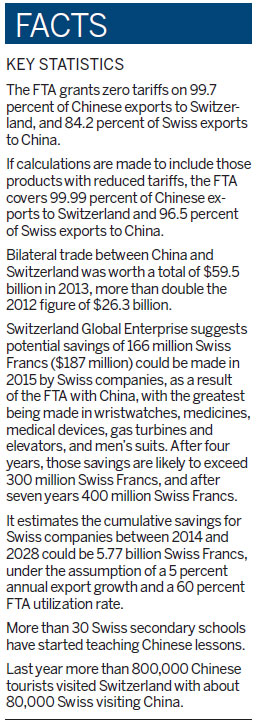
The FTA was signed in July last year between Swiss Federal Councilor Johann Schneider-Ammann and Chinese Minister of Commerce Gao Hucheng, after nine rounds of negotiations starting in April 2011.
Schneider-Ammann says the FTA complements multilateral agreements within the framework of the WTO, rather than competing against it.
The vast majority of industrial and agricultural goods exported from Switzerland will enjoy tariff concessions, meaning Swiss products will become considerably more competitive, he says.
"This will create added value for the Swiss economy and create jobs in the country."
Swiss factories in particular will benefit from lower prices for primary products used in its manufacturing industry, as Chinese industrial products and components will now receive duty-free access to Switzerland.
"The growing Chinese middle class has a high awareness of quality and brands, and so this is an important opportunity for our consumer goods industry," Schneider-Ammann says.
The trade agreement between the two countries takes on added significance as it comes at a time of mixed Swiss relations with the European Union.
In February, Swiss voters caused a rift with Brussels after narrowly endorsing curbs on EU immigration in a referendum.
Switzerland is not a member of the 27-nation union, but signed an agreement with Brussels providing for free movement between the bloc and the country in 2002.
"Following the vote on mass immigration and the uncertainties that this created in our relationship with the EU, free trade agreements with other major economies have become all the more important for Swiss industry," Schneider-Ammann says.
According to official figures, key Swiss exports to China include watches, chemicals, and pharmaceutical products.
Key Swiss imports from China include machinery, textiles, clothing, watch making equipment and chemical products.
As custom duties are phased out over a number of years, the annual potential for trade and savings is expected to increase over time.
Estimates by Switzerland Global Enterprise, a non-profit association, suggest potential savings of 166 million Swiss Francs ($187 million) could be made next year by Swiss companies, as a result of the FTA with China, with the greatest being made in wristwatches, medicines, medical devices, gas turbines and elevators, and men's suits.
After four years, those savings are likely to exceed 300 million Swiss Francs, and after seven years 400 million Swiss Francs, it says.
The organization also estimates cumulative savings for Swiss companies between 2014 and 2028 could be 5.77 billion Swiss Francs, on the assumption of 5 percent annual export growth, and a 60 percent FTA utilization rate.
Ruth Metzler-Arnold, president of the supervisory board of Switzerland Global Enterprise, says the FTA will not only benefit Swiss exporters, but also smaller suppliers.
"The FTA is politically a very important step for both countries. From an economic perspective, the advantages between China and Switzerland are also huge."
Erik Jandrasits, trade affairs manager of Scienceindustries, a business association for the Swiss chemical, pharmaceutical and biotech industries, says the FTA will greatly benefit its member companies, particularly in terms of IP protection in China.
Esther Kessler, a senior lecturer in the department of international business at Zurich University of Applied Sciences, says the FTA also sends a strong signal to other EU countries to increase trade and investment with China.
She says dealing with Switzerland will be easier for China than dealing with the whole of the EU, and that she expects to see an increase in the number of Chinese companies setting up there, to use Switzerland as a springboard into the continent.
Qin Lan, the delegate for China affairs at Greater Zurich Area, the investment support and promotion agency, already says more Chinese companies have been inquiring about setting up in Switzerland as a result of the FTA.
In fact, some have suggested they plan to make their products in Switzerland and sell them back to China, as such exports will benefit from the FTA and be able to enjoy the prestige of being Swiss-made.
Michael Vanunger, the chief executive officer of CIBC Swiss AG, says he hopes its exports of gold to China will benefit from the FTA.
Gold exports to China are not hit by high tariffs, with a lot of the business done through Hong Kong with the help of agents to avoid much of the tax.
"Those middlemen need to make money too, and that's driven driving up prices for Chinese customers.
"But if we no longer have to pay tariffs under the FTA, then we can easily export to China directly and avoid the middlemen."
Xu Jinghu, the Chinese Ambassador to Switzerland, says the FTA started to have an impact on China-Switzerland trade relations even before it came into effect, as many businesses prepared their strategies before the policy changes.
Bilateral trade between China and Switzerland was worth a total of $59.5 billion in 2013, more than double the 2012 figure of $26.3 billion.
Xu says the FTA will not only help improve China-Swiss relations, but also establish a model of cooperation that could encourage better Chinese relationships with other European countries.
She says bilateral relationships between China and Switzerland - political, economic and cultural - are now closer than ever, and that both sides are actively searching for new areas of cooperation, particularly in the scientific and financial sectors.
She says, for instance, that more than 30 Swiss secondary schools have started teaching Chinese, and last year more than 800,000 Chinese tourists visited Switzerland, with about 80,000 Swiss visiting China.
Cecily.liu@chinadaily.com.cn
(China Daily European Weekly 07/04/2014 page21)
|
|
|
|
|
|
|
|
European Weekly
 We will not give up search, Li vows
We will not give up search, Li vows
International hunt for missing airliner continues after fruitless six-day search


